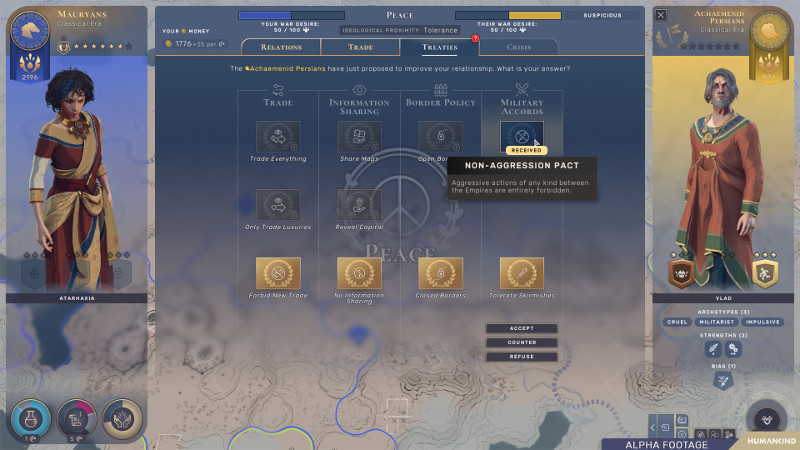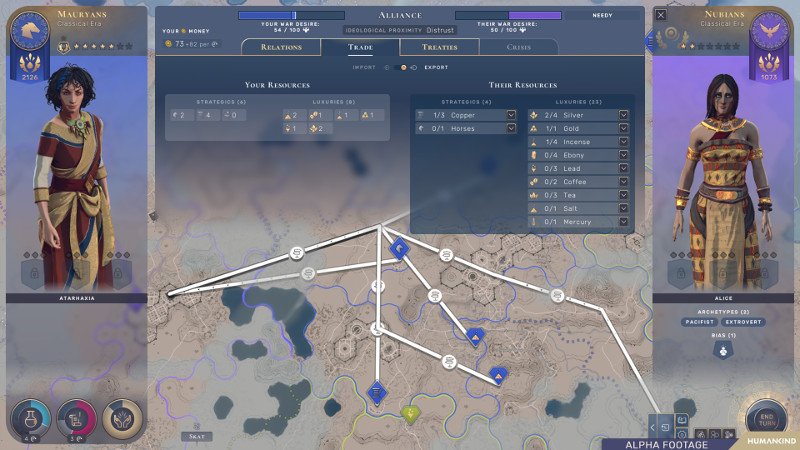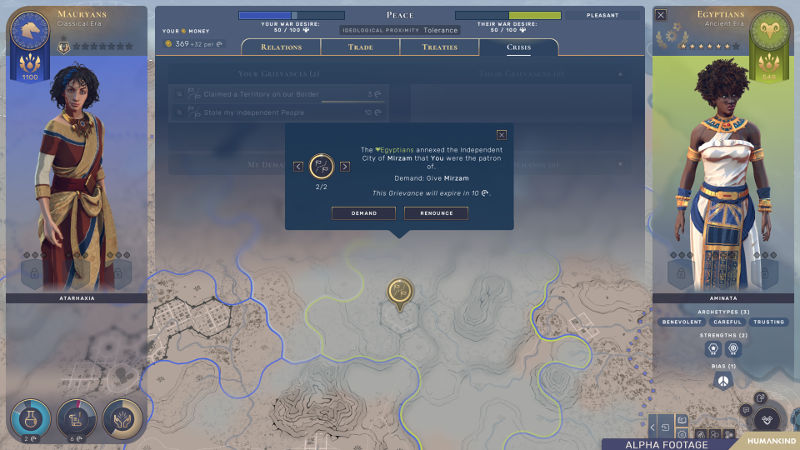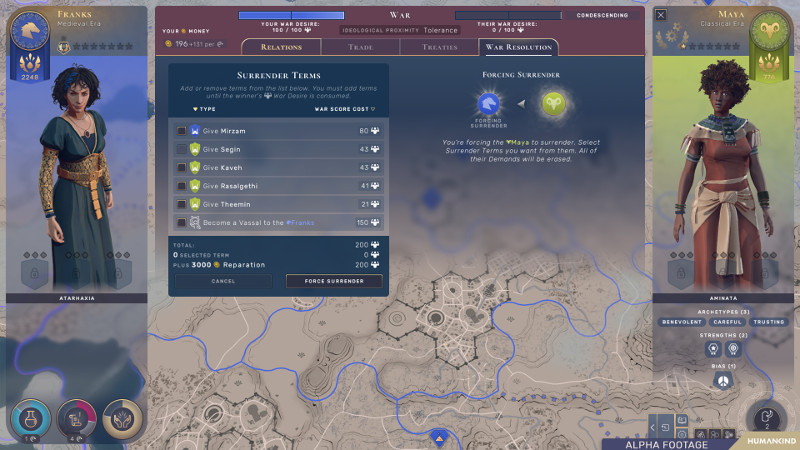In our last Feature Focus, we told you how battles work in Humankind, but these battles do not happen in isolation. While it is easy to think of battles and war as pivotal moments, open conflict is only a small part of history. Rivalries and grudges may have played important roles throughout human history, but so did trade, kinship, and alliances. So, this time we take a step back and look at the bigger picture of conflicts and cooperation between civilizations. Trade, treaties, territorial disagreements... and sometimes treason! Check out what Diplomacy in Humankind has in store for you:
For us, the stories that emerge from a player’s interactions with the map and the other competitors in a game are a crucial part of the 4X game experience. However, stories are not terribly interesting or satisfying if their beginning, middle, and end can all be summarized as “Anyway, I started fighting.” Players should be able to develop a (changing) relationship with the other empires, should find reasons to love or hate them. Even the fighting feels more meaningful if you have some history with your opponents.
The Diplomacy system in Humankind provides a system for these relationships to interact with the game instead of just existing in the mind of the player. Angry at that neighbor who forward settled you? Send them a strongly worded letter to demand they hand it over immediately. Backstabbed by your long-term ally? They’ll have a hard time maintaining that war. Through the diplomacy system, the AI can take your relationship to it into account when making decisions, but it can also contribute to the emerging story by telling you what it thinks of you.
We also wanted the diplomacy in Humankind to be grounded in the space of the game, so many diplomatic actions (like trading, for example) are tied to specific locations on the map. Furthermore, diplomacy should feel immediate and impactful, making propositions, declarations, and demands with noticeable effects, rather than negotiating the details of a deal down to the last gold piece. There are three parts to this approach: Treaties, Trade, and Grievances and Demands.
Treaties are your primary means of cooperating with other civilizations and forming closer relationships with them. While you’re at peace, you can propose treaties improving your cooperation in four different categories: Trade, Information Sharing, Border Policy, and Military Accords. For example, when you first meet another civilization, your armies are allowed to engage each other in battle in neutral territory, so you may want to suggest a Non-aggression Pact to prevent that. When you receive such a proposition, on the other hand, it’s up to you whether you accept, refuse, or ask for some monetary compensation for your cooperation.
If you are on good terms with another civilization, you may even want to form an Alliance. Two civilizations in an alliance enjoy the benefits of all treaties available during peacetime, and even gain access to another, more beneficial level of cooperation. However, alliances come with a certain degree of responsibility: Your ally may call on you to aid them in a war, and if you refuse, they will be none too pleased, and may use this legitimate reason to break your alliance.
You may want to keep some friends, though: Every civilization in Humankind can benefit from Strategic and Luxury Resources to fuel their military and economy, and while you can certainly lay claim to more territory and produce them yourself, many times it will be easier to just buy them from another civilization. As long as you’ve already signed the appropriate trade treaties, buying a resource from another civilization is as easy as clicking on their exploited resource deposit on the map, selecting the mode of transport (e.g land route versus sea route), and paying the cost for purchase and shipping.
Once a purchase is made, money changes hands immediately, and a trade route is formed between the resource deposit and your closest city through the connecting territories. If these territories are controlled by a civilization or independent people, the route will pass through their city center, but if nobody controls the territory, a trade node like a Roundhouse will be created in the region. This gives the trade routes a presence on the map, meaning that even though it is easy to establish trade, it is also easy to disrupt: For example, an army can ransack these trade nodes to gain a lot of money and break the connection, potentially depriving you of resources vital to your economy or army.
Of course, such aggressive behavior is not without consequences. Ransacking trade routes, attacking armies, claiming bordering territories, and many other actions and circumstances can generate Grievances, a sort of legitimate complaint the other civilization can raise. The affected civilization will have a few turns to decide whether they want to forego the Grievance to maintain good relations or press it to Demand compensation according to the Grievance, for example money for a broken trade route or control of a border territory. The offender then needs to decide whether they accept this demand, or refuse.
Grievances and Demands (especially ones that were refused!) will increase your war support, a measure of how willing your people are to endure protracted conflict with the other civilization. If your war support is high enough, you can formally declare war, but even if it isn’t, you can still just declare a Surprise War. Of course, such back-stabbing is generally frowned upon, and you will be branded as a traitor, souring your diplomatic relations with other civilizations.
Once war has started, the attacker’s war support will slowly decrease, as their people expect actions rather than just words. The attacker will have to win battles, ransack districts, or conquer cities to lower the enemy’s war support. Either side can offer surrender at any time, making concessions according to their own and their opponent’s remaining war support. If either side falls to 0 war support, the winner can force them to surrender, and they will have no choice but to accept as their war-weary population makes them sign on the dotted line.
How quickly your people tire of war with your neighbors also depends on how close your ideology is to theirs. The decisions you make in narrative events and the Civics you enact, like whether your people obey an absolute ruler or a council, will shape your civilization and its people by positioning you on four ideological axes. How closely these match with another civilization will define your ideological proximity. The closer you are, the better your diplomatic relations, but the harder it will be to go to and maintain a war against them. On the other hand, your people will be ready to fight for a long time against somebody whose customs and values are strange to them.
Whether you renounce all grudges to make friends and build a global trade network, or seize every opportunity to demand compensation from your neighbors and take through war what they do not give up willingly, it is up to you how you approach diplomacy in Humankind.





























































.png)




























